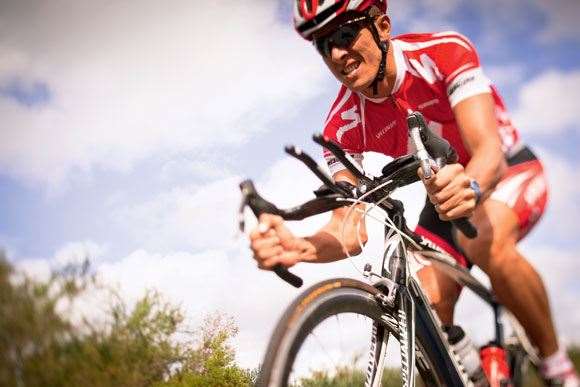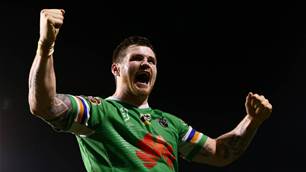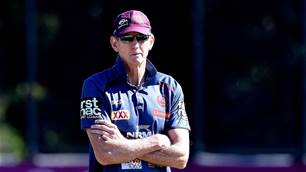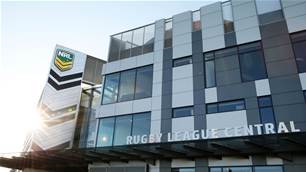Convention regularly gets thrown out the window in Camp Macca strategic meetings; he does what works,
Convention regularly gets thrown out the window in Camp Macca strategic meetings; he does what works, which usually goes against what ceiling-creating numbers and stats suggest. McCormack’s likely kicking off his preparations for London 2012 qualification as you read these words and recently took Inside Sport through how he plans to make his doubters continue to eat their words.
 Chris McCormack triathlon Bikes
Chris McCormack triathlon BikesImages: Shelby Hayden Craig
You wish you were a fly on the wall in the sports scientists’ lab when Chris McCormack won his first Ironman triathlon world title in 2007, looking down upon the same boffins who years before told “Macca” that the only thing his test result data added up to was Hawaii Ironman fantasy. To show them the finger with even more vigour, he won it again last year, adding his second victory at Kona to his five Ironman Australia wins and his ITU World Cup victory in ’98., the Sutherland Shire-born and bred 38-year-old is almost willing his detractors on as he turns his attention to an event he thought he’d never revisit – triathlon at the Olympics. Argue that McCormack has no chance of transforming his endurance racing chassis into a high-speed, high-performance model to attack London 2012 and, on most silly, archaic numerical guides, it’s hard to disagree with you. If he’s selected to represent Australia at next year’s giant sports carnival, McCormack will tackle a 1500m swim stage when he’s used to legs in the briny as long as 3.8km in Ironman. His dominant 180km Ironman bike efforts need to be transformed to an almost sprint-distance 40km Olympic stage length, while the London run leg will seem an even greater test of speed, down to 10km from his usual marathon-length (42km) Ironman distance.
Convention regularly gets thrown out the window in Camp Macca strategic meetings; he does what works, which usually goes against what ceiling-creating numbers and stats suggest. McCormack’s likely kicking off his preparations for London 2012 qualification as you read these words and recently took Inside Sport through how he plans to make his doubters continue to eat their words.
WORK ETHIC VS TALENT
“When I was 15-16 everyone was pointing at me going, ‘This kid’s a prodigy.’ But my parents were very, ‘We don’t care about sport. You study, that’s it.’ My Dad in particular: ‘You’re not missing a day of school to do sport.’ We always had these coaches coming to our house and we’d sit down with Mum and Dad and they’d be saying, ‘Your son has talent. Your son is this and these are the numbers ... ’ My Dad would be like, ‘I don’t give a shit, mate. You finish your college, you get a job and you can play sport on the weekend.’ My Dad never understood professional sport. Neither did I to some degree. Because of these labels I’ve had since I was a junior – prodigy, super-talented – people have always said, ‘Of course he’s going to kick on, he’s got this huge engine.’ But that ‘engine’ was in part designed by guys who over the years have been very open to telling me what I can’t do as well. They never put passion into their mathematical equations or data, they never put desire, grit or your work ethic. My parents instilled into me very early, ‘Work hard.’ And so the results came.
“I always wanted to do Ironman. It’s the reason I got into triathlon. I watched it on TV and thought, ‘I want to do that race.’ My brothers laughed at me. I said, ‘I’m going to win that race one day.’ When I told this to the sports scientists, they said, ‘You’ll never win Ironman – you’re too big, you’re too heavy, you can’t carry the fuel, here’s all the numbers. It’s impossible.’ Their exact words to me were, ‘The difference between reality and a dream is that one’s a reality and one’s a dream. And your Ironman aspirations are a dream.’ These are the best sports scientists in Australia telling me I’d never, ever win ... I’ve won more Ironmans than any male ever and I’ve won Kona twice against everything they’ve ever said.
“I won Ironman because I trained my arse off. I’d sit down with my team and treat it like I was the CEO of my own company. We were working out solutions to fixing problems. When we’d bring the sports scientists in, their whole answer was, ‘It can’t be done.’ So a lot of people in the sport have said about me, ‘Macca likes to put people around him who tell him what he wants to hear.’ And I’ve thought, ‘That’s exactly right, because
I want to win.’”
Related Articles

Chuffin' hell, here come more Poms!

Souths in shock Bennett swoop













